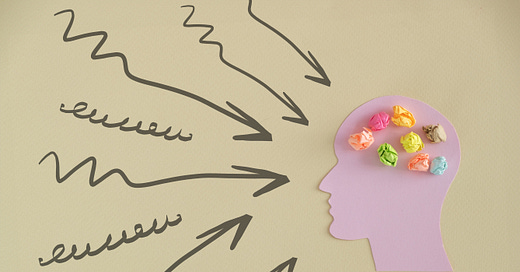Weekly Roundup: Anxiety and Cognitive Control, New Signature for Depression, Creativity Emerges in Baby Brains, and Curiosity Imaged
Weekly roundup of recent research into the brain and behaviour
A bunch of these research updates have been sitting on my computer for a bit. There have been some interesting insights into various brain processes such as in anxiety and how our cognitive control network seems to play a critical role here, but also in depression with a new neural signature being identified. These two are important because both of these affects large parts of the population.
Other research that is interesting, focuses on precisely that (“interesting”) - curiosity and creativity, curiosity being imaged and measured in new research and the first development of creativity measured in babies’ brains!
Please read on:
The Brain, Anxiety, and Cognitive Control
There has been plenty of research into anxiety and the brain as it is a major ailment and negatively impacts million of people globally.
Previous research has shown relationships to cognitive control regions in the prefrontal cortex. However there has been inconsistency in the findings, with some showing increased activity and some showing decreased activity. One of the reasons for this inconsistency could be other disorders that those with anxiety also experience - a common one being depression.
So this group of researchers in China, Zhao et al., recruited 366 participants in three groups: those without anxiety or depression, those with mild anxiety and no depression, and those with major anxiety and no depression.
The researchers used a technology called functional near-infrared spectroscopy (fNIRS) that monitors blood flow in brain regions. This was done while participants did a verbal fluency task that is known to activate cognitive control areas.
And the results?
Well as I have already alluded to, they found significant and large difference in activation levels in regions of this prefrontal cognitive control network, specifically the right dorsolateral prefrontal cortex (rDLPFC) and the left frontal eye fields (lFEF). These regions showed significantly lower activation levels in those with major anxiety and suggest that this a neural signature.
It would also be a logical signature as the cognitive control enables control of thought and also focus on topics but suppression of negative thoughts. This suggests those with anxiety are wired to not be able to do this.
From this focus on anxiety separate to depression new research has also come out in the area of depression.
A Novel and Unique Neural Signature for Depression
This is a fascinating study because it seems to answer some long unknown questions. First off we know that a fundamental feature of depression is something known as reward-response bias - that is simply how individuals respond to positive situations, rewards. In those with depression rewards may not trigger a positive response - there is general lack of positiveness.
This group of researchers, Xiao et al., of the Texas Children’s Hospital first managed to access patients with persistent epilepsy who had electrodes implanted in their brains to monitor their epilepsy. I have reported on this type of research previously because this is one of the few chances that researchers get to peer into human brains with exquisite and often precise detail.
Participants were asked to respond to questions, often used in research, and the responses and learning measured. Classically respondents show a learning and preference for the reward, correct answers. These researchers were able to find a neural signature to this:
“Neural oscillations in the beta frequency range - originating from the anterior cingulate cortex (ACC) in the frontal lobe of the brain, showed a consistently strong and positive correlation with the reward bias behavior and tracked closely with the receipt of rewards and their value.”
Keep reading with a 7-day free trial
Subscribe to leading brains Review to keep reading this post and get 7 days of free access to the full post archives.




